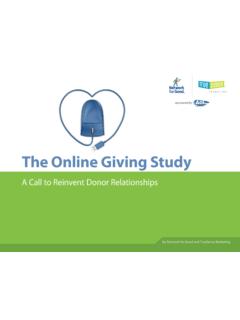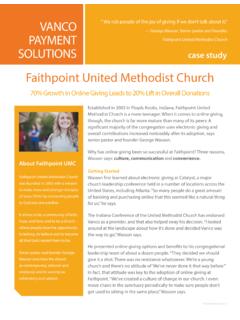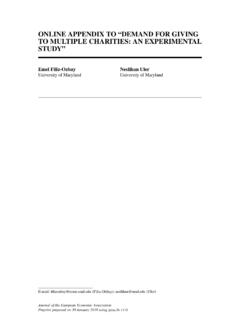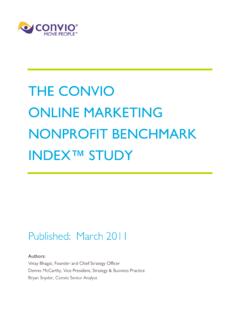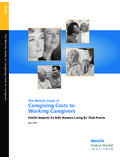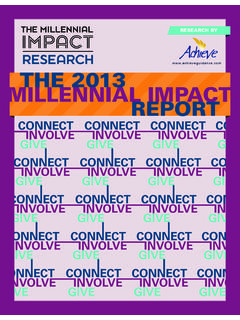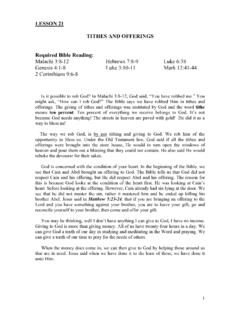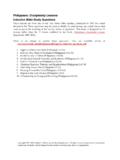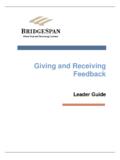Transcription of Small Donors and Online Giving - Campaign Finance Institute
1 Small Donors and Online GivingA study OF Donors TO THE 2004 PRESIDENTIAL CAMPAIGNSThe Graduate School of Political ManagementIn Collaboration with the Campaign Finance InstituteSmall Donors and Online GivingA study OF Donors TO THE 2004 PRESIDENTIAL CAMPAIGNSThe Graduate School of Political ManagementIn Collaboration with the Campaign Finance InstituteSMALL Donors AND Online Giving | ACKNOWLEDGMENTS | PAGE i This project was funded by the Joyce Foundation and conducted by the Institute for Politics, Democracy & the Internet (IPDI). We are grateful to the Joyce Foundation and to Larry Hansen, the foundation s vice president, for support and encouragement.
2 The Carnegie Corporation of New York and the Reform Institute provided supplemental funding, and we are grateful for their continued support. IPDI is the premier research and advocacy center for the study and promotion of Online politics in a manner that encourages citizen participation and is consistent with democratic principles. IPDI is non-partisan and non-profi t and is housed in the Graduate School of Political Management at The George Washington University. The Campaign Finance Institute (CFI) was a partner in this project. CFI provided access to its database of political Donors and expertise in the fi eld of Campaign fi nance.
3 CFI is a non-partisan, non-profi t Institute affi liated with The George Washington University that conducts objective research and education, empanels task forces and makes recommendations for policy change in the fi eld of Campaign fi nance. This project benefi ted greatly from the advice and assistance of many individuals. We especially thank Bob Biersack, Alexandra Cooper, Brendan Glavin, Marlinda Menashe and Clyde Wilcox. John Green, director of the Ray C. Bliss Institute of Applied Politics at the University of Akron, graciously gave this project the names of Small Donors his researchers had compiled.
4 Hal Malchow and Larry Hayes offered comments on early drafts. Research assistance was provided by Lindsay Baldwin, Julie Barko Germany, Chris Brooks, Lanny Cardow, Peter Churchill, Kathleen Legg, Zachary Morgan and Ryan Sullivan. Additional assistance was provided by Andrea Bernal, Emily Browne, Jason Cheberenchick, Julie Chung, Stephanie Macias, Megan Norden and Ainsley Stromberg. Peter Churchill supervised the survey mailing. We offer special thanks to more than three dozen political Donors from across the country who spoke with us at length about their motivations for participating in the presidential Campaign in 2004.
5 This report was written by Joseph Graf, Grant Reeher, Michael J. Malbin and Costas Panagopoulos. Graf is project director at IPDI; Reeher is associate professor of political science at the Maxwell School of Citizenship and Public Affairs, Syracuse University; Malbin is executive director of CFI and professor of political science, State University of New York at Albany; Panagopoulos is a post-doctoral fellow at the Institution for Social and Policy Studies, Yale University. The report was edited by Carol C. Darr, IPDI executive director. The Institute is administered by The George Washington University Graduate School of Political Management.
6 F. Christopher Arterton is dean of the school. For more information about the Graduate School of Political Management visit ~gspm. For more information about the Institute for Politics, Democracy & the Internet visit For more information about the Campaign Finance Institute visit Published March 2006. Designed by On Deck Communication Studio LLC of Alexandria, Virginia. ( )ACKNOWLEDGMENTSPAGE ii | PREFACE | Institute FOR POLITICS, DEMOCRACY & THE Donors AND Online Giving | PREFACE | PAGE iii For the past fi ve years the American public has witnessed a revolution in the way political campaigns are conducted in the United States.
7 Over the course of just three presidential election cycles we at the Institute for Politics, Democracy & the Internet have seen sweeping changes in how campaigns are organized, Campaign messages communicated and money raised. The Institute s charter rests on the belief that these changes can promote citizen involvement in the democratic process and greater accountability of our elected leaders. Our research agenda is dedicated to learning how best to stimulate and strengthen these possibilities. In March 2002 the Congress passed and the president signed into law the Bipartisan Campaign Reform Act, commonly known as BCRA or McCain-Feingold for its primary sponsors, Sens.
8 John McCain and Russ Feingold. This landmark Campaign fi nance legislation was passed after years of political wrangling and was only reluctantly signed by President Bush. BCRA tried to set limits on contributions to the national political parties. Those new limits created incentives for party leaders and candidates to fi nd new sources of money within the restrictions of the law. Heading into the election of 2004, it was widely hoped that the Internet would foster a signifi cant increase in the number of people who gave Small contributions to political campaigns. Just as widespread participation at the ballot box is considered healthy for our democracy, so has popular widespread participation in fundraising come to be seen as important.
9 Contributions from Small Donors connect each donor to political life and reduce the appearance of elected offi cials being beholden to a few wealthy Donors . But no one knew whether the number of Small Donors would increase substantially and whether the people who gave Small contributions or who gave money over the Internet would be different in important ways from the major Donors whose contributions have dominated presidential campaigns of the recent past. This project was prompted by a desire to understand these Small Donors and Internet Donors . Our intent was to gather data on presidential Donors in 2004 and then to refl ect on what Online fundraising and BCRA might mean for the future.
10 The full effects of these changes in political campaigning and Campaign fi nance law are only beginning to become apparent. We consider our research part of an ongoing conversation about money and politics, and we welcome comments and opportunities for discussion through our Web site ( ).PAGE iv | TABLE OF CONTENTS | Institute FOR POLITICS, DEMOCRACY & THE Donors AND Online Giving | TABLE OF CONTENTS | PAGE v OF CONTENTSA cknowledgments .. iPreface ..iiiExecutive Summary .. 1 Introduction .. 3 Methodology .. 7 Small and Large Donors .. 11 The Dynamics of Political Giving : Online and Offl ine.
